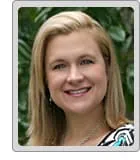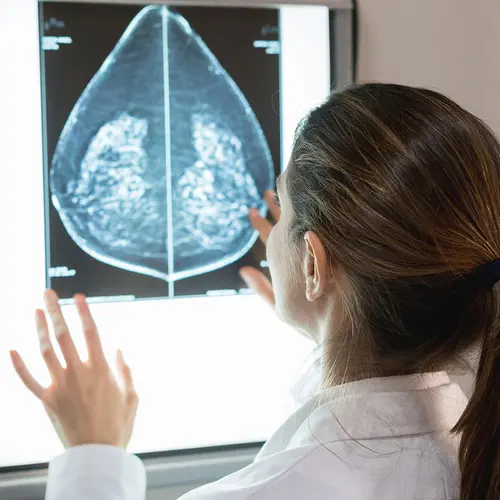
Breast cancer survivor Jenee Bobbora, 39, lives in the Houston area. When she was 32 years old, Bobbora says she woke up one day with a painfully swollen left breast. She consulted her gynecologist, thinking it might be because she had recently started taking birth control pills.
Bobbora says that doctor dismissed her request to get a referral for a mammogram, and she was angry about it. So her mother called a friend who had had breast cancer. That led to an appointment with a breast surgeon who said Bobbora's swelling was likely caused by an infection.
"He said there is this rare type of cancer called inflammatory breast cancer that you could have, but it's probably an infection. Go take your antibiotic and call me in a week," Bobbora says.
But Bobbora noticed her breast symptoms were worsening, not improving, and her breast was "starting to look a little red." So she called the University of Texas M.D. Anderson Cancer Center, told them she thought she might have inflammatory breast cancer, and got her diagnosis.
Bobbora's cancer was in her lymph nodes under her arm and in her collarbone area, and she had a 4-centimeter tumor and another 2-centimeter tumor in her left breast.
"It was truly unbelievable," Bobbora says. "When I was in there and they were telling me, the news just kept getting worse -- 'You have breast cancer, and it's this really rare kind, and it's very aggressive.'"
Her treatment: Genetic testing showed that she had a BRCA2 gene mutation linked to breast cancer; several relatives on her father's side of the family had the same mutation. So Bobbora had no qualms at all about getting both breasts surgically removed -- a double mastectomy.
"It was like, here's what you need to do, and I really did not want to die," Bobbora says.
She wanted her breasts removed, including the skin, for fear that her inflammatory breast cancer might lurk there. "I told my doctor... 'I want the most aggressive treatment that you have. I told my surgeon, don't be saving the skin and trying to make my incision pretty. Be done with it. I don't care what it looks like... I just needed to get rid of my breasts. They were bad news."
But before her surgery, Bobbora got six months of chemotherapy. And after her surgery, she got radiation therapy twice daily, and she started taking the drug tamoxifen to help kill any remaining cancer cells and to prevent cancer's return.
Her treatment, which took about a year, was often exhausting. "It took me a good two years before I had even remotely close to the energy level that I felt like I had before I was diagnosed," she says.
But she has no regrets. Bobbora likes the "big hammer theory" of treating breast cancer. "The big hammer theory is that when you find out that you have cancer, you find the biggest hammer that you have and you use it," she says. "You don't go, 'Well, I would really rather not have that,' or 'I don't want to lose my hair'... It's a very serious disease and it's not to be messed around with. But you can overcome it."
No reconstruction: Because of her intensive radiation therapy, Bobbora says her doctors advised against trying to do breast reconstruction.
"I said fine," Bobbora recalls. "Frankly, I was so tired the first years after my treatment, and my daughter was 2, and then 3, and then 4. It has just not been a priority for me." Bobbora says she hasn't ruled out reconstruction at a later date, and talked to a plastic surgeon about it last year but was daunted by what she heard about being in the hospital for seven days and not being able to drive or lift anything for six weeks afterward.
"I'm like, Stop!" Bobbora says. "I don't even want to think about that right now. Every year that's gone by, it's really not a big deal for me.... I think I do want to do it, I just don't know when it's going to be."
Adjusting to her new appearance took some work.
"When I first saw my scar, I was like, 'Oh, this is just so attractive.' You have to accept it. It is what it is, and you have to try to find a way to make yourself feel attractive," Bobbora says.
She wears breast prostheses every day that slip into her bra or tank tops.
"The prostheses are actually pretty nice," Bobbora says. "They're silicone and they're not heavy and they come in all sizes... The first ones I got were huge! I don't know what I was thinking," she says. "As time has gone by, I'm like, OK, calm down. I got some smaller ones."
Bobbora says her husband, Bill, has been supportive of her choices. "He's either the best actor in the whole world or it just has not even phased him. And probably, it's a little bit of both. He's been a complete doll or a gentleman."
Help with family: When Bobbora was diagnosed, her daughter, Jenna, was 2 years old. "Help with my child was huge for me, that someone would pick her up and take her to Chuck E. Cheese. I didn't feel like she was having to not be a child because her mom has cancer."
When offering help, Bobbora recommends making specific offers, like offering to bring a meal over or helping with children. "I think being specific and offering specific things -- can I help with X -- is a great way to treat people when they're ill," she says.
Finding meaning: Bobbora has been active in breast cancer support groups, both online and in person. And she says that in a "weird" way, her breast cancer experiences have been "enriching."
"If I had never had breast cancer, I have no idea what I would be doing in my life right now. Maybe it would be something equally meaningful, but I kind of doubt it," she says. "There is some perspective there that some people have serious difficulties in their life that they somehow get through, and it kind of encourages me that you can get through and that people are really strong."
Share your breast cancer stories on WebMD's breast cancer message board.

